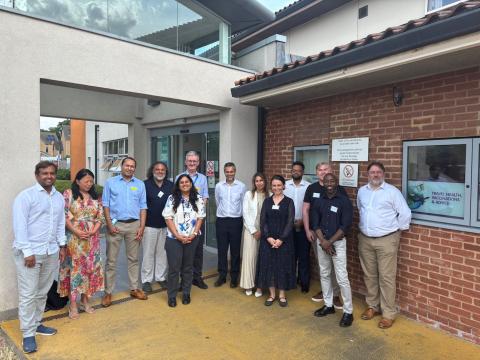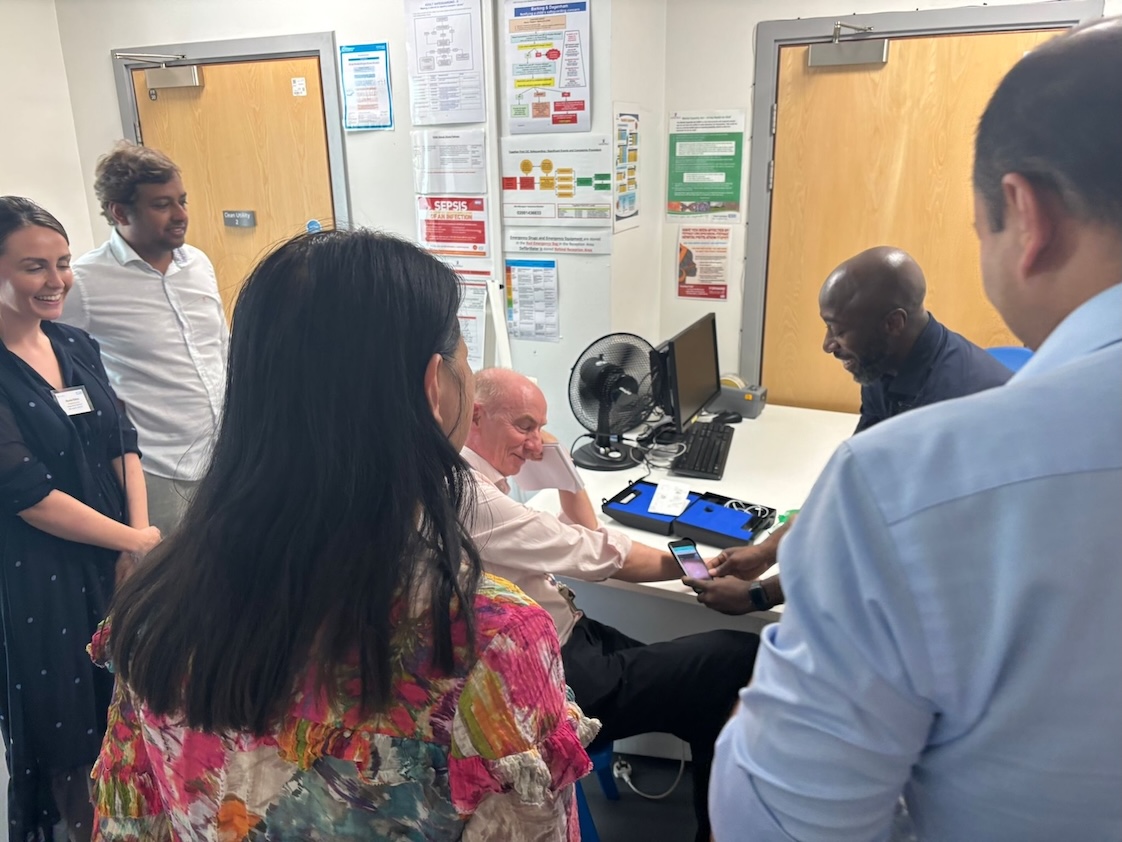Visit celebrates new AI-assisted skin cancer clinic in Barking and Dagenham
On Monday 14 July, leaders from across the NHS and local health organisations gathered at Barking Community Hospital to mark the success of a new skin cancer clinic, which is located at the hospital’s Community Diagnostic Centre.
This new clinic means that residents of Barking & Dagenham can now benefit from a cutting-edge advancement in skin cancer detection, which reduces the need for GP appointments and referrals as well as cuts down wait times for patients.
It is the result of a partnership between Skin Analytics and Together First CIC, the borough’s GP Federation, and uses DERM, an AI-powered medical device designed to detect signs of skin cancer with exceptional accuracy.
The system is being used to triage and assess skin lesions in the community, marking a transformative shift in how patients access care.
A collaborative visit to see the technology in action
The visit marks a major milestone in improving early detection and reducing waiting times for local residents when it comes to skin cancer diagnosis.
Together First, in partnership with North East London Cancer Alliance, facilitated the visit and brought together key stakeholders in cancer care to see how the new service is improving patient care.
Attendees included:
- Rosie O’Dea, Wayne Douglas, and Angela Wong from the North East London Cancer Alliance
- Fiona Wheeler, Matthew Trainer, Sas Banerjee, and Jeet Virdee from Barking, Havering and Redbridge University Hospitals NHS Trust (BHRUT)
- Craig Nikolic, Brinda Sinclair, Shanika Sharma, Sandeep Sharma, and Craig Moore from Together First CIC
During the visit, attendees received a demonstration of the DERM AI system, learning how the AI device supports faster and more accurate diagnosis. This rollout marks the first time the technology has been used in primary care in London. GP practices are now able to book assessments at Community Diagnostic Centre imaging hubs, giving patients an appointment time and date convenient to them, often within a week of the referral being received.
This will help to improve equality of access and avoid the need to wait weeks for a hospital referral, bypassing GP appointments which are freed up for other patients in need.

How the technology works
DERM is currently the only AI system for skin cancer detection to be approved for use in the NHS. DERM can analyse moles and skin lesions without a doctor needing to review the images first, helping the doctor to triage based on the risk assessment.
The AI has been trained on a vast dataset of skin images, enabling it to safely distinguish benign from potentially cancerous lesions; which is reviewed by the clinician assessing the patient.
For patients, this means quicker reassurance or diagnosis when it comes to skin cancer. The AI assesses the skin lesion and advises the clinician on whether a referral to a specialist dermatologist is needed for further investigation or if the patient can be safely discharged. If the AI indicates that the lesion is non-cancerous, some patients may be able to avoid a hospital visit altogether and if needed, receive treatment for other skin conditions within the community.
Dr Shanika Sharma, Clinical Lead and GPwER in Dermatology at Together First, highlighted the significance of this rollout:
“This is a really exciting development for our community and has been an excellent example of collaboration between Together First, the Cancer Alliance, BHRUT and Skin Analytics. By using AI to detect skin cancer earlier we can improve the patient experience and reduce waiting times for our residents.”

Improving access and reducing inequalities
One of the key advantages of the new clinic is patients no longer need to endure long waits for hospital outpatient appointments or travel out of the borough for diagnostics. The new service ensures that people are seen faster and closer to home.
The use of DERM is particularly impactful in communities like Barking & Dagenham, where socioeconomic and health inequalities have historically affected outcomes. By removing unnecessary steps in the care pathway and targeting resources to those most in need, the system helps ensure earlier detection of skin cancer, when it is most treatable.
DERM has already been successfully deployed in other parts of the NHS, where it has been used to assess over 170,000 patients, identifying more than 15,500 cases of skin cancer. In previous deployments, it has reduced the number of urgent in-person dermatologist appointments by up to 95%, allowing specialists to focus on complex or high-risk cases.
A model for the future
For NHS leaders and clinicians, the Barking visit offered an important opportunity to explore how AI can be safely and effectively embedded into clinical pathways without compromising care.
Rosie O’Dea, Project Manager at North East London Cancer Alliance, said the collaboration was a testament to what can be achieved when innovation is embraced across the system.
“We’re seeing the power of partnership in action. This service shows how we can combine technology, clinical expertise, and community care to make a real difference to patient outcomes.”
“Bringing diagnostic innovation into community settings is key to delivering early diagnosis and tackling inequalities. We’re proud to support this work and look forward to building on its success.”
Patient Feedback and Next Steps
While the rollout is still in its early stages, feedback from patients has been overwhelmingly positive. Many have reported feeling reassured by the speed and professionalism of the service, as well as the ease of attending appointments locally.
As the clinic continues to assess more patients in Barking & Dagenham, ongoing evaluation and data collection will inform the future scale-up of the service. The integration of AI into everyday clinical practice is still a developing field, but early indications suggest this project could become a landmark example of successful innovation within the NHS.
Raising awareness of skin cancer
Alongside the new service, North East London Cancer Alliance and its partners are also promoting skin cancer awareness through community outreach, sun safety campaigns, and digital resources. Residents are encouraged to learn more about how to spot early signs of skin cancer and take steps to protect their skin during the summer months.
To find out more about skin cancer prevention and early diagnosis, visit the Get LDN Sun Set campaign webpage or listen to the North East London Cancer Alliance’s podcast series, episode 24.





